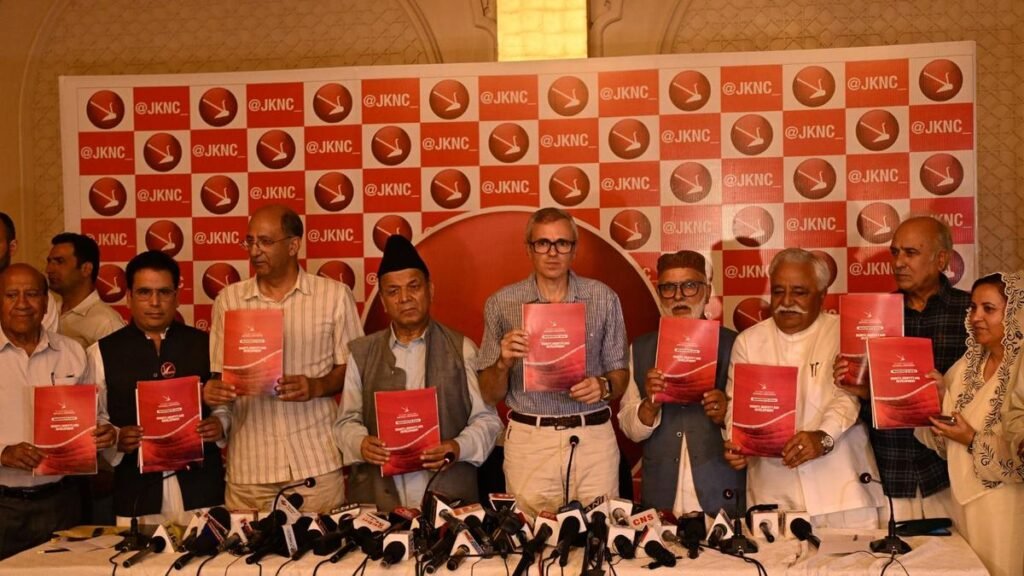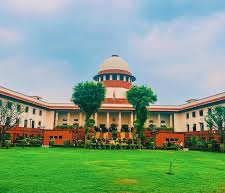
The Supreme Court of India mandated that State Assembly Elections must be held in the Union Territory of Jammu and Kashmir from 18 September to 1 October 2024 in three phases. These legislative elections are the first to be held since the abrogation of Article 370 and the re-organisation of J&K into the Union Territories of J&K and Ladakh. The Manifesto of the JKNC (Jammu Kashmir National Conference) Alliance is a throwback to the turbulent decades between 1947 and 2019.
JKNC’s promise to demand the restoration of articles 370, 35-A and of the Constitution and flag of the State brings back dark memories of the time when a permit system was in place for visiting Jammu & Kashmir. SP Mukherjee raised the slogan ‘EK Nishan, Ek Samvidhan, Ek Pradhan’, entered Kashmir without a permit, was arrested and subsequently passed away in captivity. The nation was aflame with slogans of ‘Ek Desh mein Do Nishan, Do Samvidhan, Do Pradhan nahi ho sakte’. One nation cannot have two flags, two constitutions and two Prime Ministers. Does Congress support this call for the restoration of a separate special status, which was rejected by the Indian people decades ago?
Article 370 is a Union Article; Article 35-A was decreed by presidential order 1954 – How does a state government propose to bring them back? This pledge seems to be an appeal to separatists. Article 370 was the cause for many progressive laws like the RTE not being applied to J&K. Article 35-A gave the right to a state government to issue domicile certificates through which citizens of India became State subjects. It confined Valmikis to doing sweeper jobs. Pakistani refugees, Chaambh refugees, POJK refugees had no rights under State Law. Children of domiciled women marrying non-domiciled males had no rights to parental property. Reservations for Paharis, Bakarwals and other minorities were denied by these articles.
The Manifesto of JKNC calls the Shankaracharya Hill ‘Takht-e-Suleiman’ and Hari Parbat as ‘Koh e Maran’– reviving the Islamist separatist agenda of obliterating the Hindu history of Kashmir.
The promise of autonomy for J&K is the most troubling part of the Manifesto which is silent on Pakistan-Occupied Kashmir, focusing instead on trade across the Line of Control. Autonomy and plebiscite are dead issues, therefore raising them while ignoring the issue of illegal occupation of territories of Jammu & Kashmir by Pakistan can be presumed to be an attempt to revive Separatism.
The Manifesto awakens memories of the days when terrorists ruled the roost. It brings back memories of a paralysed, compromised administration that stood by while Islamists systematically targeted Kashmiri Hindus: women were raped, men murdered in public. The same leaders oversaw the systematic targeting of Kashmiri Hindus, whom hospitals refused to treat, shops selling items at higher prices to Hindus, Leading Kashmiri pandits being killed in public view or forced to leave their ancestral land under threat.
Calling ancient Hindu sites by Islamic names betrays the intent to erase the Hindu past of Kashmir while uprooting the Hindu population from the Valley.
Indians need to remember that Sheikh Abdullah was arrested when he was on his way to Muzaffarabad in POJK to talk about an Independent Kashmir. The so-called Land-to-Tiller Act disempowered the Kashmiri and Jammu Hindus. Sheikh Abdullah got nominations made by the Praja Parishad party cancelled and marginalised the Jammu region.
Farooq Abdullah went to POJK and attended a rally with separatists. The intentions of the NC have always been as suspect as the PDP’s. They both pander to separatists for the sake of holding power.
The Joint Manifesto is silent on the question of reclaiming POJK and contains no plans for POJK refugees, West Pakistan refugees, and other marginalised populations while championing issues that have lost relevance since 2019.
Voters need to remember the dark decades when terrorists ruled the streets and laid siege to Hazratbal while the military stood by helplessly, when Yasin Malik shot uniformed Air Force officers in broad daylight and when the daughter of the State home minister was kidnapped to force the release of terrorists. The local leadership of the time enabled those tragic acts to take place.
During the dark decades, the holy Amarnath Yatra was targeted by armed militants and every link to the Hindu past was under threat of eradication. Voters need to remember the exploitative Roshini act, which grabbed government land to settle thousands of Rohingya refugees in the Jammu region in an attempt to change its demography.
The manifesto of the JKNC alliance attempts to draw J&K back to those dark, violent decades when cinemas were closed, bandhs took place daily, schools were shut and tourism dwindled dramatically.
The Congress Party was largely complicit with the NC through all the past decades. It supported article 370, bought in Art 35-A, and stood by when the exodus of Kashmiri Hindus took place. It seems to support the same policies now– The Manifesto needs to be opposed and questioned nationally. The accords made by Nehru, Indira Gandhi and Rajiv Gandhi with Sheikh Abdullah and Farooq Abdullah enabled the rise of terrorism in Jammu & Kashmir. The same Parties now appear to support the return to the Status Quo Ante.






Very nice details of the position in J-&K
Congratulations